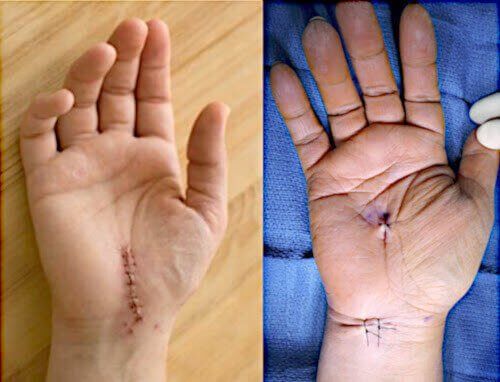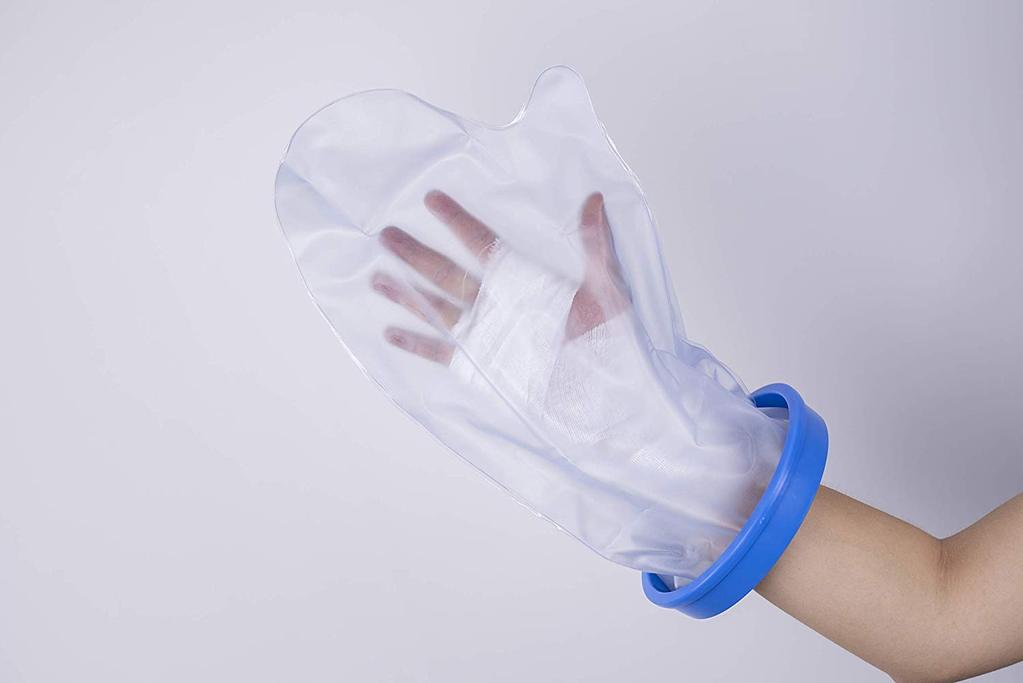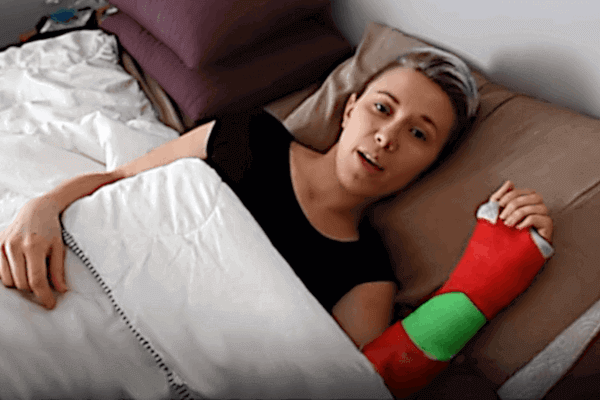Aftercare for Carpal Tunnel Surgery
Table of Contents
- What factors affect aftercare for carpal tunnel surgery?
- First weeks of aftercare
- First month of aftercare
- Final months of aftercare
- Your occupation
- Returning to work
- Summary
- FAQs
- About
It's at home, after the hand operation, that your aftercare for carpal tunnel surgery actually begins. It's also the beginning of a long haul. But with the right preparation it will be over before you know it.
Getting comfortable with knowing what to expect after
carpal tunnel release surgery
is the smart thing to do right now. Easing the anxiety about the unknown makes life better all around. So understanding what
to expect and
when
is a great start.
Depending on how fast you heal and how well you manage the post-surgical
pain, aftercare is usually relatively simple. YES, there will be
post-surgical pain to deal with. And at times it will be intense. That's why you'll have pain medicines right next to you.
The only other major concern to consider is the possibility of
complications
during recovery. Common complications include problems like delayed reaction to the anesthesia, bleeding, infection or nerve damage. Any of those can make the surgery aftercare more lengthy and complicated.
But let’s stay positive!
We'll assume there won't be complications and all goes well during your
carpal tunnel surgery recovery.
What factors affect aftercare for carpal tunnel surgery?
Exactly how long your aftercare will take depends on several factors. Generally these include:
- The type of surgery you had.
Open release surgery will require more extensive aftercare than
endoscopic surgery.
- Dominant hand surgery. If surgery was on your dominant hand, aftercare will take longer.
- Your overall health. If you have chronic conditions like
diabetes,
fibromyalgia, etc. then healing will take more time.
- Smoking delays healing. Smoking will prolong your aftercare time.
- Complications are always an issue. If you have
complications then aftercare for carpal tunnel surgery will be longer and more involved.
First weeks of aftercare
When you arrive home from the operation, and for the next 2 weeks until the stitches are removed, you must be careful to treat the surgical area with tender loving care.
- Take precautions to
avoid bumping
or banging your hand into things. Even while your hand is in bandages, a light bang can easily rip your stitches open. Then you have to go back to the doctor and start the aftercare clock from the beginning.
- Also, be sure to
elevate
your hand as often as you can. Elevate higher than your heart’s level because this will reduce swelling in the fingers and also reduce the pain in the wrist area.
- Avoid vigorous activities, and try to limit your movements to small motions. These include toileting, brushing your teeth, combing your hair, feeding yourself, and dressing. Getting help for these is ideal.
- It’s important to wiggle your fingers periodically so they don’t stiffen. But don’t over-do it.
- When bathing, keep the dressing dry. Wear a loose fitting rubber glove (most people prefer a plastic trash bag) on your hand and arm when showering. Specialty protective covers are also available.
- A crucial part of immediate aftercare for carpal tunnel surgery is
pain management. There will be pain, but your doctor will have given you a prescription for pain medication for the first week.
Be sure to fill that prescription before the operation!
Follow the instructions for taking the medicine to avoid unnecessary pain.
- After about 4-5 days you should be able to manage any residual pain with over the counter
medications for carpal tunnel syndrome. These include non-steroidal anti-inflammatory drugs (NSAIDs) like ibuprofen (Advil, Motrin) or acetaminophen (Tylenol).
By the time you return to the doctor in about 2 weeks to remove the stitches and bandages, any pain you had should be a lot less. At that point, you will graduate to wearing a wrist brace for the remainder of your aftercare. Also at this point, you will be able to drive a car safely.
First month of aftercare
What a relief! Those itchy stitches and bandages are gone. Your patience has paid off, but you still have:
- Tenderness in the wrist
- An itchy scar
- Pain when gripping or pinching
These feelings are completely normal and will lessen in the next few weeks.
- At this point,
scar management becomes important. Keep the scar clean and dry. You can gently massage the scar and surrounding skin with vitamin C + E cream.
- In this period of aftercare for carpal tunnel surgery most patients report reduced grip and pinch strength. This is also normal. At first it will be too painful to grip or pinch anything firmly. That’s why you must do this slowly and work up to harder gripping strength. If you don’t have the complication of nerve damage as a result of the surgery, grip and pinch strength should be back to normal in 3 months.
- This is also the time to begin
hand therapy after carpal tunnel surgery. Stretching, strengthening, and range of motion exercises are all part of the physical therapy your hand will need. The surgeon will give you instructions for all of these.
- You will also do more vigorous activities with your hand. This is the period of aftercare for carpal tunnel surgery where most patients can return to work.
Final months of aftercare
The final phase of your aftercare can last for a couple months up to a year. It depends on you, including your ability to heal and the amount of effort you put into rehabilitation and strengthening your hand.
If your job doesn’t require a lot of manual work, then returning to work will be relatively easy – but you may need to take occasional short breaks for hand rests. Again, this assumes you experienced no surgical complications.
Finally – and this may sound odd – pay special attention to your
job function.
That’s because carpal tunnel syndrome is an "occupational disease". That means the job probably allowed the condition to develop in the first place.
High-risk (harmful) activities and jobs that require a lot of forceful and repetitive hand movements are probably the cause.
Your occupation
It will be necessary for you to pay special attention to your
job function. That’s because carpal tunnel syndrome is an
occupational disease. That means your job probably allowed the condition to develop in the first place.
This is how it happens. The repetitive hand movements result in a condition known as
repetitive stress injury (RSI). RSI is like a precursor to getting carpal tunnel syndrome. And it is well established that your occupation is the major cause of RSI.
Therefore, jobs that require a lot of forceful and repetitive hand movements put you at risk for carpal tunnel syndrome. Examples of such jobs are:
Returning to work
The National Institutes of Health reports that about
half of patients who had carpal tunnel surgery were able to return to their former job. Recognizing whether or not your job caused the condition (and whether or not you should continue with it) is a critical aspect of good aftercare for carpal tunnel surgery.
Summary
Proper aftercare for carpal tunnel surgery determines how long you'll be out of commission. The length of time depends on several factors. These include the type of surgery you have, your commitment to rehab, whether or not you had complications, and your own general health. From the time you leave the surgical center to when your hand is restored can take months to years.
FAQs
Should I have somebody take care of me after my surgery?
Having a helper for the first 3-4 days after carpal tunnel surgery is a good idea. It will make doing ordinary tasks like eating less painful.
How do I know when to go back to work?
Your doctor will advise you about returning to work. If surgery was on your non-dominant hand usually you can go back much sooner.
How long do I need to keep my hand elevated after surgery?
This time can vary. Generally you will not need to elevate your hand once your stitches are removed.
About









